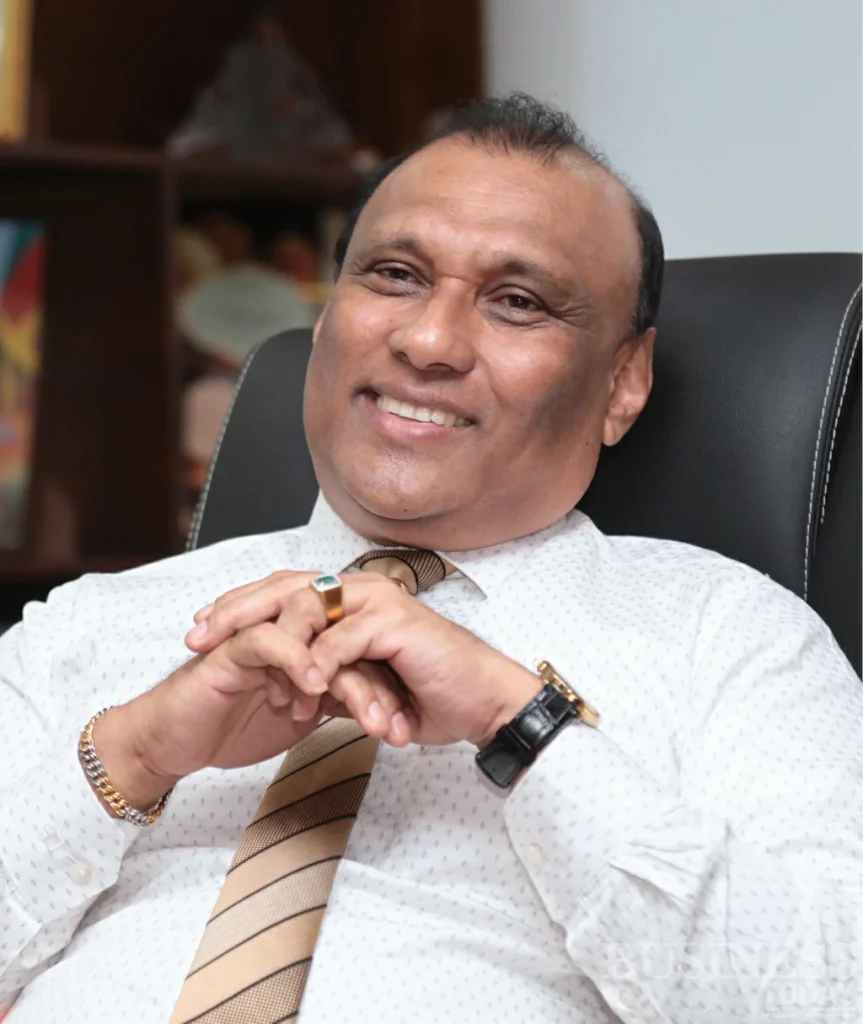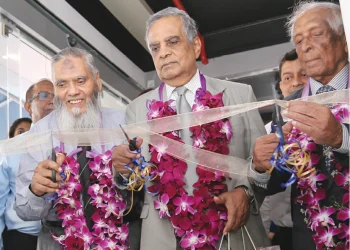
The Merchant Bank of Sri Lanka & Finance (MBSL) has an interesting story. Having been the first merchant bank in the country, there are many experiences as well as knowledge that MBSL can share with the industry. Successfully absorbing previously defunct financial institutions into its fold, MBSL has proven that with clear guidance and direction, stability and high performance can be garnered. With a focus on SMEs and empowering Sri Lankan businesses as their strategy, MBSL continues to be a partner in the growth of the economy. Dr Sujeewa Lokuhewa, Chairman, speaks about the priority of MBSL as it continues to fulfil its mandate as the pioneering merchant bank of the country.
By Udeshi Amarasinghe Assisted by Gayathri Kothalawala
Photography Mahesh Bandara and Menaka Aravinda
The Merchant Bank of Sri Lanka was the first merchant bank of the country. Can you elaborate on the journey of MBSL?
Initially established as a specialised management consultancy division of Bank of Ceylon, Merchant Bank of Sri Lanka became the first merchant bank of the country in 1982.
We are the only subsidiary finance company of the Bank of Ceylon. Following the introduction of the open economy in 1977, the private sector started to boom and they entered the development and business sectors. As such there was a need to guide the private sector in terms of business management. The MBSL was positioned in this manner.
After a decade of operations, MBSL entered into retail activities as there were limited availability in leasing, retail credit and short time credit in the market.
In 2015, another major change took place. Three of our subsidiaries including Merchant Credit of Sri Lanka, Ceylease and MBSL Savings Bank which was earlier Ceylinco Savings Bank were merged with Merchant Bank of Sri Lanka. Therefore, we provide both services of merchant banking as well as financial services.
What about the performance of MBSL?
We are a listed company in the stock exchange. Our performance is published in terms of accounts. In the recent past we have focused on the retail market share aggressively, especially in the leasing category. We are a public enterprise, as such while profit is important; serving the need of the country is also imperative. This is a vital part of our business.
MBSL Has Always Been A Business-To-Business Service Provider. We Have Been Catering To Large Businesses And Have Focused On Share Market And Capital Market Activities. But, Now Attention Has Been Given To The Rural Sector Too..
Therefore, we have looked at the SME sector as well as agriculture. We have performed well in these two areas and thus our total revenue has grown significantly over the years.
We provide training for our staff members in Sri Lanka and also overseas. In the last two years alone, we received many international awards. One is the award for Best Sri Lankan Employer, then Asia Best Employer award, Global Best Employer award, in France we received the Europe International Award for Quality 2017 as well as Emerging Financial Institute of the Year at the Middle East Asia Summit Award 2017 and Global HR Excellence Award 2018 – Best Service Provider awarded by World HR Congress.
In terms of the strategic direction, what are the priority segments for MBSL?
In the past few years, economic development has been driven by the construction industry. However, as an economy, we need to look at production and increased volumes of exports. As a step forward, the Government has taken the initiative to develop the SME sector.
We too feel that our strategy lies in this sector. MBSL has always been a business-to-business service provider. We have been catering to large businesses and have focused on share market and capital market activities. But, now attention has been given to the rural sector too.
As finance institutions, we need to look after the SME sector, the people who are starting their businesses. They require management consultancy services and finances. Our vision is to elevate the SME sector to medium and large scale. Thereafter to list them in the stock exchange. We have worked with many such companies in the past. This will in turn push economic development as well as the much-needed exports.
Presently we have 48 branches and business places islandwide covering all districts including Jaffna, Batticaloa, Trincomalee and Kilinochchi. We are mainly concentrating on providing more than capital to support the Sri Lankan businessmen. Our systems are fully geared with state-of-the-art technology, and we are uplifting the branch network, products and services. All the branches and business places are renovated, offering a new theme to give better products and services to our customers.
In our country, banking or financing is mainly based on collateral, on security. We are looking at going beyond that phase. Thereby focusing on the business plan of the entrepreneur, cash flow, the type of ideas he brings to the table, innovation, value addition and export. Our evaluations for financing are based on these areas. We always want to take our clients’ businesses to the next level; that is the whole concept of merchant banking in the world. We too are following that concept. We are focusing on reviving that idea and bringing value to the Sri Lankan business sector.
Can you elaborate on the work done with the SME sector?
We want to prepare Sri Lankan businesses so that they are able to utilise the opportunities in the economy as the country develops. Generally, what happens is that multinational or foreign companies that have strong financial banking enter the market thus pushing out the smaller players in the domestic market. If the Sri Lankan businessman is not strong enough to exploit the available opportunities, we will lose again.
We truly want to contribute in strengthening Sri Lankan businesses by providing them with the knowledge, management capabilities, skills and structuring their business plans so they will be able to acquire the maximum. Otherwise someone else will come from outside and cater to the requirement that is presented. The role of MBSL is to strengthen local businesses. We want the Sri Lankan companies to come forward and claim significant roles.
We Want To Prepare Sri Lankan Businesses So That They Are Able To Utilise The Opportunities In The Economy As The Country Develops.
In terms of obtaining capital, generally businesses opt for loans assuming that this is the only available option. However, that is not the case. There are other methods to raise capital. Listing the company is one way of acquiring low cost capital and it is much less risky than taking a loan. With high interest loans, the cash flow is hindered. There are other options; that can be exploited.
Many Sri Lankan businesses are not aware of these facilities. Therefore, our role is to prepare them, provide the information and the knowledge. Thereby show them the path to gain capital and to reach a strong level where they can capture the opportunities of Sri Lanka becoming a hub.
What are your thoughts on the trade financing and the investment-banking sector in Sri Lanka?
Presently larger banks are still concerned with collateral, even for trade financing and import loans. There are few banks that allow the pledging of the stocks of imports. Very few look at the business plan and finance a project. That is the area that we wish to step in and cater to.
In developed countries this approach can be seen greatly. But in Sri Lanka our interest regime is high. Therefore, finding capital is a challenge. Companies in the finance and banking sector are making a profit based on collateral lending and high rates.
In terms of trade finance, we want to develop and introduce new products. Of course risk has to be mitigated but we will look at whether the balance sheets are strong and then finance. It will not be purely based on collateral. We want the exporters to have stronger balance sheets, manage their wealth properly, have corporate governance built into their systems and have a strong company, so that they have more opportunity to obtain capital from any finance institution.
Is it sustainable for MBSL with other financial institutes too offering services and products in this area?
In the long run, sustainability will be an issue. Because margins are shrinking and there are high volumes of inter-bank transactions or lending. There was a plan sometime back for consolidation of the sector with mergers. We were the first merger and the only one that took place without any layoffs of employees.
However, there are still gaps in the market. There are niches that are yet to be served, even though there are so many banks and financial institutions. Competition is always good and it is for the benefit of the customer. But there are still customers or segments that are not yet part of the financial system. We need to focus on them.
As you mentioned MBSL completed the only merger and you had to take on almost two defunct companies in the process. Can you elaborate on that experience?
The most important aspect that we have to mention is that during the merger, not a single staff member was laid off. It was a challenge, but what we did was, firstly we introduced the right training platforms and provided training for all the staff. There were issues in terms of credit quality due to knowledge gaps, evaluation gaps and certain other issues. It is essential that employees have the knowledge to judge credit accurately. Therefore, we first addressed the knowledge issue and then strengthened our recovery network. Through this mechanism we were able to control non-performing advances.
We Feel The Fastest Way To Reach The Customer Is Through Digital Channels. We Have Invested Heavily On Our IT Infrastructure And We Are Looking At Digital Services, Mobile Apps, And Other Services.
Identifying customers and treating them with respect was also another important area we looked at. Of course there are wilful defaulters, but that is a small percentage. However, some customers do not pay because of their cash flow issues. Once we lend funds we have to follow up and also look at the purpose of the loan. We have to ensure whether the monies have been invested for the purpose that it was originally given for.
There are certain segments where financial discipline is low, especially in the SME sector. We look at the function of the loan, ensure that the loan is used for the purpose it was given for and also assure that there is proper cash flow planning. As a bank, we have to sit with the customer, plan their cash flow and ensure that they comply with the plan. Engaging in legal procedures is a long and cumbersome process. It is more fruitful to sit with the customer and discuss their business plan, cash flow and ensure that they generate cash through their business in a disciplined manner to repay the loans. With these procedures in place and with the efforts of the staff, we were able to control the debt and prove that the mergers were successful.
How does MBSL compare with global products and services in this sector?
We are on par with in terms of standards. But there is much more we can do in terms of innovation. In Sri Lanka we have the CRIB for credit matters, but we are yet to connect the other aspects into the network. Products wise, we are at a very good level. The only drawback is that the interest is too high. Digitally, there is more to achieve. There are many areas in which Sri Lanka is far behind; starting with the KYC – know your customer. We do not have a digital KYC as yet. India being a large country has already implemented this. If we achieve that goal, many services would be accessible digitally on the mobile phone. Therefore, in terms of digital development, we are somewhat behind.
How will MBSL contribute to Sri Lanka becoming a centre in trade and investment?
That is a very intense topic, but we have many challenges. Singapore, Thailand and India have already established themselves as trade and investment centres. It will be difficult for the country to achieve that level but we can because our human resources are of better standards. It is a matter of having the infrastructure in place, which I believe the Government too is focusing on. If the infrastructure is ready, Sri Lanka has the human capital and the banks too are prepared; we only need to fast track the plans.
Can you tell us about your experience in this sector?
I have been in this sector for the last 30 years and have worked in different companies at various senior management and director levels. At present, I am the Chairman of the Merchant Bank of Sri Lanka & Finance and the Chairman of the MBSL Insurance Company. I will utilise my experience to take MBSL further in its growth journey.
Future plans for MBSL in the coming year?
We feel the fastest way to reach the customer is through digital channels. We have invested heavily on our IT infrastructure and we are looking at digital services, mobile apps, and other services. We are in discussion with other banks and the Central Bank on digital KYC. We are also expanding our ATM network. We are confident that the future will depend on digital development. As such, that is our focus in the future.





